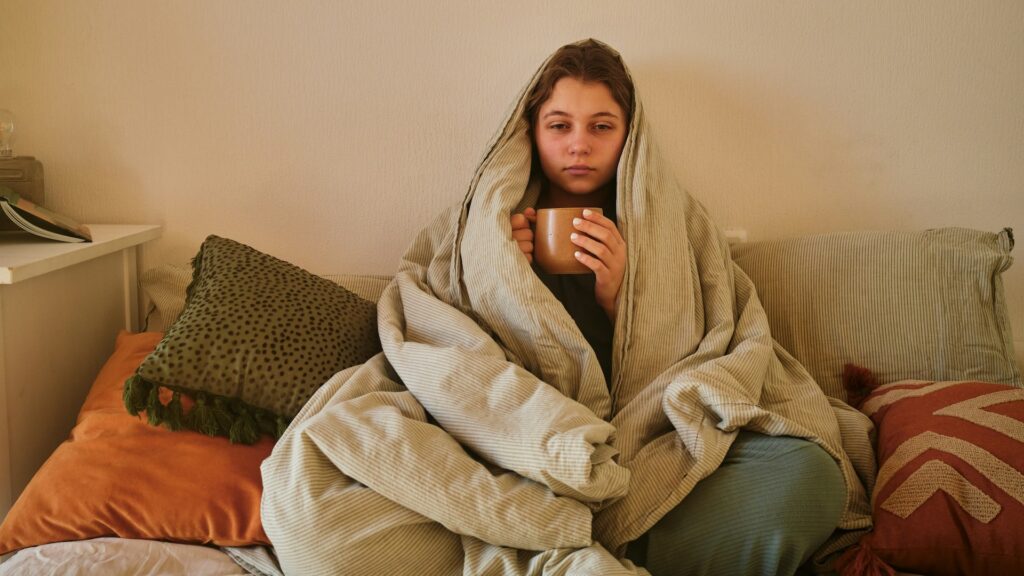You don’t always notice it straight away, but your environment plays a massive role in how you feel.

You might consider it your sanctuary and have it set up just how you like it, but that doesn’t necessarily mean it’s doing you any favours. As it turns out, sometimes, it’s the small, overlooked things in your home that slowly but surely drag your mood down without you realising. If you have these things in your home, it’s time for a change.
1. Clutter you’ve stopped seeing

That pile of unopened post. The shoes in the hallway. The half-finished projects gathering dust. Clutter builds up slowly, and once it becomes part of the background, it starts weighing on you in a way that’s hard to explain. It’s not just about mess—it’s about mental load. Too much visual noise can make your brain feel overwhelmed, even when you think you’ve learned to ignore it.
2. Harsh, artificial lighting

Cold overhead bulbs or fluorescent tones can create a low-key stress response. They flatten your space, kill the mood, and make everything feel a little more clinical than comforting. Natural light is ideal, but even swapping to warmer-toned lamps or softer bulbs can help your space feel more restful—and your mood more regulated.
3. An unmade or uncomfortable bed

It sounds small, but it sets the tone. When your bed looks uninviting or feels like an afterthought, it subtly reinforces that rest isn’t a priority. Sadly, when your sleep suffers, your mood usually follows. A quick bedding refresh, fluffing the pillows, or simply making it each morning can give you a small but steady sense of control and comfort.
4. Neglected corners or “dead” spaces

We all have that area that collects random junk—an unused chair, a dusty shelf, a mystery drawer. However, as time goes on, these neglected spaces can send the message that your home (and by extension, your life) is stalled or incomplete. You don’t need to Marie Kondo every inch, but clearing even one forgotten area can change the energy in the room, and in your mind.
5. Old to-do lists and reminders staring at you

Whiteboards with outdated plans, sticky notes that were never ticked off, goal sheets from six months ago—they can start to feel like silent accusations. Instead of motivating you, they quietly drain you. Refreshing what’s visible in your space helps release some of that pressure. Your home should support your present, not haunt you with tasks from the past.
6. Rooms that don’t reflect who you are anymore

Maybe your decor was once intentional, but now it feels mismatched with the person you’ve become. Spaces that feel outdated or impersonal can leave you feeling disconnected, even in your own home. You don’t need to redecorate everything—just a small change that reflects your current self can help you feel more rooted and seen.
7. Too much noise—or eerie silence

Constant background noise, like the telly always on, can feel like mental clutter. Of course, on the other end, total silence, especially when it’s heavy, can start to feel isolating. Both extremes can subtly impact your emotional baseline. Finding a sound environment that works for you—whether that’s music, ambient noise, or a quiet corner—is a small change that helps balance overstimulation and loneliness.
8. Empty walls or spaces that feel neglected

Bare spaces can sometimes reflect how empty you’re feeling on the inside. If your walls are blank not by choice but because you haven’t had the energy to care, it can reinforce a feeling of stuckness or low motivation. You don’t need a gallery wall. Even one photo, piece of art, or colour that lifts your spirit can change the mood of an entire room, and help reconnect you to something joyful.
9. Neglected cleaning tasks you keep putting off

You keep meaning to clean the bathroom properly or take out the bin or sort the fridge, but it never quite happens. And every time you notice it, you feel a twinge of guilt or frustration. It’s not about being spotless. But taking care of these small things creates a sense of movement. Momentum in your space can help you feel less stuck in your head.
10. Not having a corner that feels genuinely restful

If there’s nowhere in your home that feels like a safe exhale, it’s easy to stay stuck in low-level tension. Every room becomes functional—none of them feel like refuge. Creating a single spot that’s just for calming down—a blanket, a chair, a candle, a window—can chnage how supported you feel by your space. You don’t need much, just one small corner that feels like a “you’re okay” signal.


